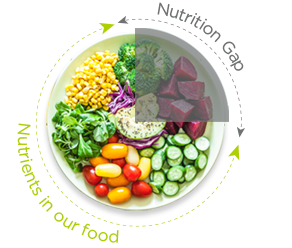

The nutrition gap philosophy has been part of Cytoplan’s approach for more than 20 years, however as we know, everything evolves with time and this has led us to conduct another thorough review of the latest research which we have compiled in to a comprehensive booklet known as the nutrition gap guide.


What is the nutrition gap?
The nutrition gap describes the difference between the levels of nutrients the average person, eating a reasonable Western diet, is primarily obtaining from food, and those nutrient levels identified by research as being needed for optimal health in the population.
“The nutrition gap is responsible for the rise in chronic degenerative diseases seen in the Western world over the past 40 years”
Many factors contribute to the nutrition gap including:
Sedentary lifestyle


Our ancestors (hunter-gatherers) ate 4,000+ calories per day and needed every one as they were a lean and active beings. Our sedentary lifestyle means we eat 2,000 calories per day and even that is too much for some, but we still need the micronutrients (the vitamins and minerals) in 4,000 calories as our physiology is relatively unchanged from the Palaeolithic era.
Improvements in technology, such as those that spawned the agricultural revolution, the industrial revolution and the digital age have prompted large systemic reductions in the amount of physical work required by humans.
“Low energy expenditure and low-calorie needs are directly accountable for 50% of the Nutrition Gap”
Food choices


Many people’s diets are high in refined, processed foods that offer low nutrient density and empty calories. There is often an emphasis on how many calories we should be eating – but calories are not all created equal.
Diets in the 1930s consisted of fresh, free-range meat and locally grown, seasonal fruit and vegetables. For many Victorians Sunday was the only day when they would eat meat. Mothers were also at home more often and typically took more time to prepare and cook fresh meals – these habits were then passed on to their children.
In the mid-Victorian era, their incidence of chronic degenerative disease was 10% of ours. Although modern medicine has reached the highest level of sophistication, keeping us alive longer, the incidence of degenerative disease continues to increase. We are now living longer – just not in health.
Only 17% of teenagers and young adults cook their meals from scratch each day
Modern farming methods


The key to life and nourishment in food is the bio-vitality of the soil in which it grows. Soil is the rock on which plant nutrition stands.
The early forms of agriculture were more sustainable. Fodder crops rotated with nitrogen-fixing crops and grazing animals ensured mineral-rich fruit and vegetables, grown in mineral-rich soil. This process naturally re-mineralised and replenished the ground for the next crop. Soil depletion, transport storage, genetically modified organisms, the use of pesticides & herbicides and deep ploughing all affect the nutrient content of food.
On average our food was 45-125% more nutritionally rich 60 years ago
Food processing


Once a food is harvested, it begins to deteriorate quickly due to multiple factors. The food processing sector provides the systems, machinery and equipment that helps the food industry keep foods safe. However, the further a food is from its natural form, the less it keeps its natural nutritional composition (e.g. milling of flour reduces calcium, magnesium, zinc and folate).
Although the food processing sector is rising to the challenges of modern demand and a rapidly increasing population, it is not without sacrifice. Most food processing methods have a detrimental effect on micronutrient levels and can reduce the mineral content of food by up to 80% depending on the method involved.
The rise in chronic disease in the Western world is linked to the level of nutrients being ingested
Absorption and assimilation of nutrients


Absorption is the process of absorbing food, in the form of nutrients, into the bloodstream. To be able to absorb nutrients our digestive system must be working correctly. Many factors play a role in poor digestive health, including; high-stress levels, not enough sleep, eating processed and high-sugar foods and taking antibiotics.
Assimilation is the movement of digested food molecules into the cells of the body, where they are utilised. Chewing our food well, sufficient levels of hydrochloric acid, plenty of beneficial gut bacterial and healthy cell integrity of the gut are all essential for essential nutrient assimilation.
The metabolic outcome of the food we eat is determined by the efficiency of our body to absorb and assimilate nourishment
Lifestyle choice


Stress, dieting, smoking, alcohol consumption, exercise intensity, frequent sun-bathing, medications, sleep quality toxins (inhaled or ingested) and antibiotics – all either deplete our body of some essential nutrients or increase our needs for individual nutrients.
Shockingly, ½ of women and 45% of men in England regularly take prescription drugs and out of 2,000 people surveyed 35% admitted to counting calories to lose weight indicating a reduction in micronutrients.
Genetic factors


We all have slightly different genetic variations and these can change the extent to which different foods or nutrients are used by our bodies. The gene variations change our susceptibility to different diseases and can make certain dietary changes dramatically more significant for one person that another.
It is only with more recent research discoveries in the field of Epigenetics and Nutrigenomcs that the relevance of individualised nutritional requirements, based on genetics, has become far more apparent. The increased understanding of the relationship between individual genetic variation and diet, plus the fact that genomic data is much easier to obtain and at an affordable cost, means that nutrigenomic evaluation of an individual can be implemented with practicality.
Guide to The Nutrition Gap
We have put together an extensive guide which explores what the nutrition gap is and the contributing factors, how this impacts our health including evaluating evidence to link it to the rise in chronic degenerative diseases in the Western world and possible solutions to solving what is described as a ‘global epidemic’.
The statistics
We put together an infographic showing just some of what our research has uncovered about the nutrition gap; including a research study we commission involving 2,000 adults to find out what people’s beliefs and behaviours about calories are and whether they ever consider levels of vitamins, minerals and essential nutrients when it comes to choosing the food we eat.
We found some pretty worrying results including 4 in 10 ‘obsess’ over calorie counting but have no idea what else they might be consuming and half of the respondents have been more sedentary in the last year - estimating on average they eat more than 2000 calories a day - but only burn 1,800.

